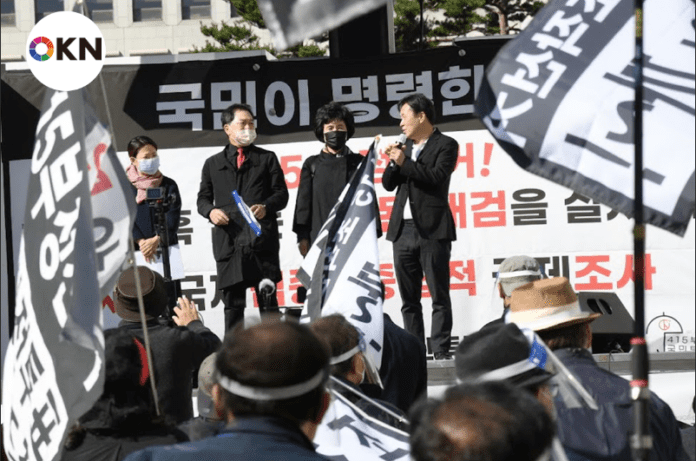Whole-heartedly we urge the Supreme Court of Korea to play its due role in examining April 15th congressional election of Korea.
The essence of democracy is to find its legitimacy in self-governance as each citizen’s autonomous decision-making collectively contributes to the constitution of the government. In this sense, elections are not only the flower of democracy, but the root, the stem and the fruit. Many people doubt the legitimacy of governance through the April 15th election, given numerous indications that the votes were rigged, and various circumstances and statistics supporting them.
If so, the Supreme Court, which is an exclusive organ handling the election litigation, ought to proceed with the trial process as soon as possible to present a reasonable answer based on appropriate evidence to the suspicions that people have raised. The judiciary, despite its unelected power, exists as one of the three powers of a nation to serve as the last bastion of legitimacy of democracy. The Supreme Court’s move in relation to a series of legal claims on election invalidity filed after April 15th raises suspicions that it is not functioning as a judicial power dealing with checks and balances, but is actively reading the mind of the political power as an administrative agency that has dispatched a Supreme Court justice as the chairman of the National Election Commission and appointed judges of the competent courts as local Election Commissioners in each constituencies.
The mere action the Supreme Court did for almost 180 days, the processing deadline stipulated by the Public Official Election Act, was to ignore the plaintiff’s various applications for evidence and to neglect the NEC’s action of destroying evidence in the name of inspecting and replacing ballot sorter and equipments related to early voting. Given the fact that the NEC possesses all the information and data on voting affairs, the NEC’s position with the endorsement by the Court to pass the burden of proof to the side of plaintiff under the pretext of preparation of court proceedings can only be a distortion of the nature of election litigation. Only when people’s doubts are properly resolved through fair election litigation, a fair election culture can be established and healthy liberal democracy can be realized through elections in which everyone accepts. The basis of fair election litigation is to make the election management agency responsible for the clarification of reasonable suspicions about the election process, not to make the plaintiff in the information asymmetry responsible for the clarification. Even now, the Supreme Court must order the NEC to submit the data requested by the plaintiff and to clarify the suspicion on its own. The verification process through objective and neutral experts, if necessary, overseas experts, should also be adopted.
Only then will they be able to relieve to a certain extent the responsibility for the willful delay ever since the lawsuit was filed. These clarification and verification should include at least such factors as (i) the accuracy of the electoral register, (ii) sampling or whole-scale survey of whether the voters actually voted particularly in the out-of-jurisdiction early vote, (iii) strictness of monitoring in the process of ballot (including registered mails) transportation, (iv) possibility of hacking on the electronic counting machines, using the simulation skill that restores the original voting system at the time of voting, (v) inquiry on damages to the sealed ballot boxes that happened before the counting process, (vi) inquiry on damages to the ballot boxes that have been subject to court orders for evidence preservation after the counting process, (vii) QR code verification, and (viii) forensic verification of ballot image files.
The Supreme Court must learn the painful lessons from the judiciary of Netherlands, Ireland, and Germany that abandoned the electronic counting system by reviving paper and pencil elections. It was their common standard of judicial conscience that election systems should not be allowed, regardless of whether there were real election frauds, if the transparency of the election process was not guaranteed and if the system could not be verified by the eyes of ordinary citizens. Is it a luxury to expect this level of conscience from the Korean Supreme Court?
Ordinary citizens of Korea are worried and angry over the past few months that all the public authorities of Korea have ignored requests for verification of various equipment and systems essential to verifying transparency in voting and ballot counting processes and that they even showed no willingness to preserve evidence for the ballot image, which is essential for verifying the honesty of election results.
We urge that the Supreme Court, on the minimum conscience of judges, thoroughly and fairly examine the election-related litigations and present the result to the people, not to bring indelible shame to the history!
Oct 22, 2020
Professors’ Solidarity for Freedom and Justice (PFJ), South Korea
The PFJ is a non-political group of 6,400 full-time professors over 370 universitues in Korea. For further information, please contact Dr. Wonmog Choi, Co-President of PFJ, Professor of Law, Ewha Womans University at Seoul (wmchoi@ewha.ac.kr, +82-2-3277-3344)


